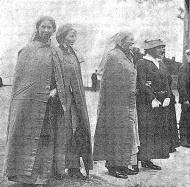Events In History
-
 29 August 1914NZ force captures German Samoa
29 August 1914NZ force captures German SamoaColonel Robert Logan led a 1400-strong expeditionary force to capture German Samoa (later renamed Western Samoa). The Germans stationed there were in no position to resist. Read more...
Articles
New Zealand in Samoa

New Zealand was ill-equipped to cope with the Western Samoa mandate allocated by the League of Nations in 1920. The Mau movement's passive resistance culminated in the violence of 'Black Saturday', 28 December 1929, which left 11 Samoans and one New Zealand policeman dead.
-
Page 2 – Background
When war broke out in Europe in August 1914, Britain asked New Zealand to seize German Samoa as a 'great and urgent Imperial service'.
Capture of German Samoa

When war broke out in Europe in August 1914, Britain asked New Zealand to seize German Samoa as a ‘great and urgent Imperial service’. Although the tiny German garrison offered no opposition, at the time it was regarded as a potentially risky action.
-
Page 2 – New Zealand in the Pacific
Samoans were not consulted when Britain, Germany and the United States agreed to partition their islands in December 1899.
-
Page 3 – Seizing German Samoa
With hindsight, New Zealand's capture of German Samoa on 29 August 1914 was an easy affair. But at the time it was regarded as a potentially risky action with uncertain
-
Page 4 – Wartime administration
German officials were replaced by New Zealand military officers, civilians, or British residents. These often lacked the experience or qualifications to do the job.
-
Page 5 – Further information
Find out more about the capture of German Samoa in the First World War.
First World War farewells

Between 1914 and 1918, New Zealanders farewelled more than 100,000 men as they headed off to a military training camp or went straight to war.
- Page 1 - First World War farewellsBetween 1914 and 1918, New Zealanders farewelled more than 100,000 men as they headed off to a military training camp or went straight to war.
First World War - overview

Archduke Franz Ferdinand, heir to the throne of the Austro-Hungarian Empire, and his wife Sophie were assassinated in the Bosnian city of Sarajevo. This was a key event in sparking the Great War of 1914–18.
- Page 4 - New Zealand goes to warBefore the outbreak of war, Prime Minister W.F. Massey had made it clear that New Zealand’s main contribution would be supplying troops to the major theatre of conflict. But
NZ's First World War horses

Between 1914 and 1916 the New Zealand government acquired more than 10,000 horses to equip the New Zealand Expeditionary Force. They served in German Samoa, Gallipoli, the Middle East and on the Western Front. Of those that survived the war, only four returned home.
- Page 4 - German SamoaA total of 141 New Zealand horses were transported to Samoa during the First World War. Of these, 25 were despatched with the Samoa Advance Party of the New Zealand Expeditionary
NZ Railways at war

The railway system and its workforce was one of the most valuable assets available to the New Zealand state to support the national effort during the First World War
- Page 4 - Railwaymen in the NZEFMore than 5000 permanent NZR employees served overseas during the war, about 40% of the 1914
HMS Philomel

New Zealand's first warship, HMS Philomel formed the core of the country's naval forces during the First World War. The aged and largely obsolete vessel was commissioned in New Zealand in July 1914, and went on to serve in the Pacific, Mediterranean and Middle East.
- Page 1 - NZ's first warshipNew Zealand's first warship, HMS Philomel formed the core of the country's naval forces during the First World War. The aged and largely obsolete vessel was commissioned in New
Biographies
-
 Logan, Robert
Logan, Robert
Robert Logan ran the military administration of German Samoa on behalf of Britain during the First World War.
Read more...
Related keywords
- WW1
- WW1 home front
- railways
- whanganui city
- nurses
- maheno (hospital ship)
- basin reserve
- wellington city
- auckland city
- hms philomel
- samoa
- royal navy
- western front
- pioneer battalion
- postal service
- stamps
- wellington harbour
- shipping
- horses
- disease
- royal new zealand navy
- navy
- percival hall-thompson
- devonport
- edward knowles
- robert logan
- influenza pandemic
- pacific islanders
- british empire
- international relations
- mau movement
- german navy
- war objects
- germany
- league of nations
- postcard
- cartoon
- international trade
- helen clark
- flags
- chinese
- race relations
- anzac
- gallipoli campaign
- hospital ships
- WW1 stories
- evelyn brooke
- japanese
-
Main image: Samoan Advance Party Roll of Honour
Auckland War Memorial Museum holds a roll of honour listing the names of members of the Samoan (N.Z.) Expeditionary Force who later enlisted for further service and died during the First World War.




















